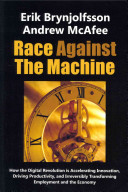The Population Must Increase Education to Stay Ahead of Technology
...the relative demand for skilled labor is closely correlated with advances in technology, particularly digital technologies. Hence, the moniker “skill-biased technical change,” or SBTC. There are two distinct components to recent SBTC. Technologies like robotics, numerically controlled machines, computerized inventory control, and automatic transcription have been substituting for routine tasks, displacing those workers. Meanwhile other technologies like data visualization, analytics, high-speed communications, and rapid prototyping have augmented the contributions of more abstract and data-driven reasoning, increasing the value of those jobs.
Skill-biased technical change has also been important in the past. For most of the 19th century, about 25% of all agriculture laborthreshed grain. That job was automated in the 1860s. The 20th century was marked by an accelerating mechanization not only of agriculture but also of factory work. Echoing the first Nobel Prize winner in economics, Jan Tinbergen, Harvard economists Claudia Goldin and Larry Katz described the resulting SBTC as a “race between education and technology.” Ever-greater investments in education, dramatically increasing the average educational level of the American workforce, helped prevent inequality from soaring as technology automated more and more unskilled work. While education is certainly not synonymous with skill, it is one of the most easily measurable correlates of skill, so this pattern suggests that demand for upskilling has increased faster than its supply.
Notes:
As people are automated out of jobs, society must increase their educations in order to keep them on top of the machines.
Folksonomies: education technology employment automation
Taxonomies:
/business and industrial/agriculture and forestry/agriculture (0.642223)
/technology and computing (0.410358)
/technology and computing/electronic components (0.353877)
Keywords:
skill-biased technical change (0.991171 (positive:0.338987)), economists Claudia Goldin (0.885599 (neutral:0.000000)), numerically controlled machines (0.877908 (neutral:0.000000)), computerized inventory control (0.868656 (neutral:0.000000)), easily measurable correlates (0.863367 (positive:0.707173)), Nobel Prize winner (0.843732 (neutral:0.000000)), average educational level (0.840248 (negative:-0.381143)), relative demand (0.701181 (positive:0.490736)), Increase Education (0.693108 (positive:0.534376)), skilled labor (0.682886 (positive:0.490736)), digital technologies (0.674731 (positive:0.314881)), data-driven reasoning (0.670361 (positive:0.517671)), distinct components (0.667758 (neutral:0.000000)), routine tasks (0.659426 (negative:-0.231130)), unskilled work (0.658920 (negative:-0.614420)), recent SBTC (0.657156 (neutral:0.000000)), high-speed communications (0.650564 (positive:0.409749)), automatic transcription (0.649807 (negative:-0.231130)), data visualization (0.646991 (positive:0.309152)), Larry Katz (0.645705 (neutral:0.000000)), American workforce (0.645336 (negative:-0.381143)), Jan Tinbergen (0.639268 (neutral:0.000000)), Ever-greater investments (0.637920 (neutral:0.000000)), 19th century (0.635901 (neutral:0.000000)), factory work (0.628671 (negative:-0.421383)), 20th century (0.626482 (neutral:0.000000)), technology (0.533216 (negative:-0.101864)), jobs (0.486566 (positive:0.534376)), agriculture (0.477710 (neutral:0.000000)), mechanization (0.475658 (neutral:0.000000))
Entities:
Claudia Goldin:Person (0.773286 (neutral:0.000000)), Nobel Prize:EntertainmentAward (0.765919 (neutral:0.000000)), Larry Katz:Person (0.692600 (neutral:0.000000)), Jan Tinbergen:Person (0.656828 (neutral:0.000000)), 25%:Quantity (0.656828 (neutral:0.000000))
Concepts:
Nobel Prize (0.980061): website | dbpedia | freebase | opencyc | yago
Learning (0.738798): dbpedia | freebase | opencyc
Laborer (0.692958): dbpedia | freebase
Automation (0.678788): dbpedia | freebase
20th century (0.677757): dbpedia | freebase | yago
Education (0.639656): dbpedia | freebase | opencyc
Higher education (0.577890): dbpedia | freebase
Technology (0.570405): dbpedia | freebase






